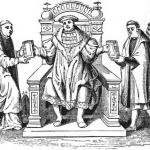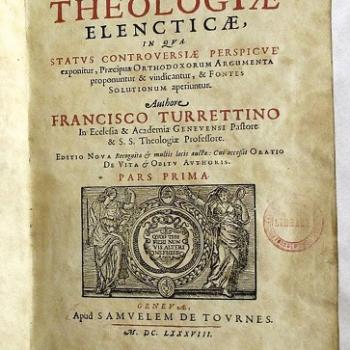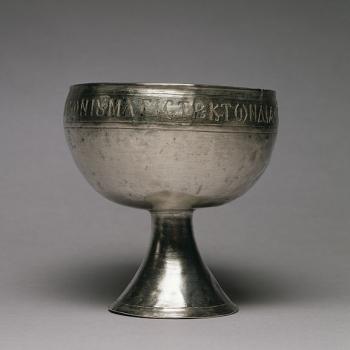Agreement Regarding God’s Nature, But Differences Concerning the Rule of Faith & Concupiscence
“Please Hit ‘Subscribe’”! If you have received benefit from this or any of my other 4,600+ articles, please follow this blog by signing up (w your email address) on the sidebar to the right (you may have to scroll down a bit), above where there is an icon bar, “Sign Me Up!”: to receive notice when I post a new blog article. This is the equivalent of subscribing to a YouTube channel. Please also consider following me on Twitter / X and purchasing one or more of my 55 books. All of this helps me get more exposure, and (however little!) more income for my full-time apologetics work. Thanks so much and happy reading!
***
See my introductory article for this series. Excerpts from the Augsburg Confession (“AC”) will be identified and indented, in regular black font. Replies from the Catholic Confutation (“C”) will be in blue, and counter-replies from the Lutheran Apology of the Augsburg Confession (“AAC”) in green. Neither will be indented. My own comments will be in regular black font.
***
Article I: Of God
Our Churches, with common consent, do teach that the decree of the Council of Nicaea concerning the Unity of the Divine Essence and concerning the Three Persons, is true and to be believed without any doubting; . . .
Here there is virtually total accord. C notes that in this article the AC “agrees in all respects with the rule of faith and the Roman Church.” AAC reiterates the happy unity: “The First Article of our Confession our adversaries approve, . . .”
Not to nitpick, but I would like to point out one noticeable difference here, having to do with Christian authority, or the rule of faith. C states: “the Council of Nice, convened under the Emperor Constantine the Great, has always been regarded inviolable.” This is the Catholic rule of faith, in which ecumenical councils (as part of the magisterium of the Church) are infallible. Protestantism’s rule of faith, sola Scriptura, on the other hand, holds that only the Bible is infallible, and Luther denied the infallibility of ecumenical councils in the Leipzig Disputation with Johann Eck in 1519.
Yet note that AC holds that the Council of Nicaea’s teaching regarding the doctrine of God (what is called “theology proper”) “is true and to be believed without any doubting.” I ask, then, how is that not in effect de facto infallibility? If it must be believed, then it follows that it must be infallible, at least at that particular point. And the confession (AC) that noted this must also be regarded as infallible in this statement.
Otherwise, the Lutheran who adheres to his own confessions, which in this instance refer to the sublime authority of an ecumenical council, would be bound to error and falsehood. Yet we’re told that the individual believer ultimately has the right to dissent from any [what he or she deems to be] non-biblical or unbiblical teaching, on the grounds of sola Scriptura and private judgment and conscience. That was Martin Luther’s central and most famous point at the Diet of Worms in 1521, as summarized in his climactic words:
Unless I am convinced by the testimony of the Scriptures or by clear reason (for I do not trust either in the pope or in councils alone, since it is well known that they have often erred and contradicted themselves), I am bound by the Scriptures I have quoted and my conscience is captive to the Word of God.
What’s to stop an individual Lutheran, then, from asserting sola Scriptura and refusing to accept the Nicene teaching on God? In theory and ultimately, by logical reduction, nothing at all. This is the internal contradiction and incoherence — or at the very least, strong tension — in the Lutheran and larger Protestant rule of faith. The observant, obedient Lutheran simultaneously must not doubt this conciliar teaching about God, while at the same time indeed they can doubt it, including even appealing to their founder Luther’s own stance, whereby he rejected not just one or two or a few, but at least fifty teachings and practices of the Catholic Church, by 1520: before he was excommunicated.
So Catholics and Lutherans agree on this article about God, which is great, but in doing so, the Catholic position is internally non-contradictory and coherent, whereas the Lutheran view is neither. It breaks down under the sort of fairly minimal scrutiny: some of which I provided above.
Article II: Of Original Sin
Also they teach that since the fall of Adam all men begotten in the natural way are born with sin, that is, without the fear of God, without trust in God, and with concupiscence; and that this disease, or vice of origin, is truly sin, even now condemning and bringing eternal death upon those not born again through Baptism and the Holy Ghost.
To Article II.
In the second article we approve their Confession, in common with the Catholic Church, that the fault of origin is truly sin, condemning and bringing eternal death upon those who are not born again by baptism and the Holy Ghost. For in this they properly condemn the Pelagians, both modern and ancient, who have been long since condemned by the Church. But the declaration of the article, that Original Sin is that men are born without the fear of God and without trust in God, is to be entirely rejected, since it is manifest to every Christian that to be without the fear of God and without trust in God is rather the actual guilt of an adult than the offence of a recently-born infant, which does not possess as yet the full use of reason, as the Lord says “Your children which had no knowledge between good and evil,” Deut 1:39. Moreover, the declaration is also rejected whereby they call the fault of origin concupiscence, if they mean thereby that concupiscence is a sin that remains sin in a child even after baptism. For the Apostolic See has already condemned two articles of Martin Luther concerning sin remaining in a child after baptism, and concerning the fomes of sin hindering a soul from entering the kingdom of heaven. But if, according to the opinion of St Augustine, they call the vice of origin concupiscence, which in baptism ceases to be sin, this ought to be accepted, since indeed according to the declaration of St. Paul, we are all born children of wrath (Eph. 2:3), and in Adam we all have sinned (Rom.5:12).
The counter-reply of AAC is very long, so I will only cite parts of it:
The Second Article, Of Original Sin, the adversaries approve, but in such a way that they, nevertheless, censure the definition of original sin, which we incidentally gave. . . . we say that those thus born have concupiscence, and cannot produce true fear and trust in God. . . . when we mention concupiscence, we understand not only the acts or fruits, but the constant inclination of the nature [the evil inclination within, which does not cease as long as we are not born anew through the Spirit and faith]. But hereafter we will show more fully that our description agrees with the usual and ancient definition. . . . The scholastic teachers also, not sufficiently understanding the definition of original sin, which they have received from the Fathers, extenuate the sin of origin. They contend concerning the fomes [or evil inclination] that it is a quality of [blemish in the] body, and, with their usual folly, ask whether this quality be derived from the contagion of the apple or from the breath of the serpent, and whether it be increased by remedies. With such questions they have suppressed the main point. . . .
Augustine, . . . is accustomed to define original sin as concupiscence [wicked desire]. For he means that when righteousness had been lost, concupiscence came in its place. For inasmuch as diseased nature cannot fear and love God and believe God, it seeks and loves carnal things. God’s judgment it either contemns, when at ease, or hates, when thoroughly terrified. Thus Augustine includes both the defect and the vicious habit which has come in its place. Nor indeed is concupiscence only a corruption of the qualities of the body, but also, in the higher powers, a vicious turning to carnal things. Nor do those persons see what they say who ascribe to man at the same time concupiscence that is not entirely destroyed by the Holy Ghost, and love to God above all things. . . . Nor only the ancients [like Augustine and others], but also the more recent [teachers and scholastics], at least the wiser ones among them, teach that original sin is at the same time truly these, namely, the defects which I have recounted, and concupiscence. . . . In reference to original sin we therefore hold nothing differing either from Scripture or from the Church catholic, but cleanse from corruptions and restore to light most important declarations of Scripture and of the Fathers, that had been covered over by the sophistical controversies of modern theologians. . . .
But they contend that concupiscence is a penalty, and not a sin [a burden and imposed penalty, and is not such a sin as is subject to death and condemnation]. Luther maintains that it is a sin. It has been said above that Augustine defines original sin as concupiscence. If there be anything disadvantageous in this opinion, let them quarrel with Augustine . . . Augustine, in a long discussion, refutes the opinion of those who thought that concupiscence in man is not a fault, but an adiaphoron, as color of the body or ill health is said to be an adiaphoron . . . not only many passages of Scripture, but simply the entire Church [and all the Fathers] will contradict them. . . .
. . . we know that we believe aright and in harmony with the Church catholic of Christ. . . . in this case our adversaries, to a great extent, do not understand what they say. They often speak what is contradictory, and neither explain correctly and logically that which is essential to [i.e., that which is or is not properly of the essence of] original sin, nor what they call defects. But we have been unwilling at this place to examine their contests with any very great subtlety. We have thought it worth while only to recite, in customary and well-known words, the belief of the holy Fathers, which we also follow.
Lutherans and the early Protestants generally, erroneously believed that concupiscence (desire to or tendency towards sin) was itself a sin and a remnant of the guilt that we inherited from Adam. Trent condemned this opinion in section 5 of its Decree Concerning Original Sin in its Session 5 on June 17, 1546, four months after Luther’s death:
If any one denies, that, by the grace of our Lord Jesus Christ, which is conferred in baptism, the guilt of original sin is remitted; or even asserts that the whole of that which has the true and proper nature of sin is not taken away; but says that it is only raised, or not imputed; let him be anathema. For, in those who are born again, there is nothing that God hates; because, There is no condemnation to those who are truly buried together with Christ by baptism into death; who walk not according to the flesh, but, putting off the old man, and putting on the new who is created according to God, are made innocent, immaculate, pure, harmless, and beloved of God, heirs indeed of God, but joint heirs with Christ; so that there is nothing whatever to retard their entrance into heaven. . . .
As usual, Melanchthon, following the playbook, suggests that Lutherans follow St. Augustine in this respect and that Catholics don’t. But I submit that the opposite state of affairs is in fact the case. St. Augustine wrote:
Chapter 25 [XXIII.]— Concupiscence in the Regenerate Without Consent is Not Sin; In What Sense Concupiscence is Called Sin.
Now this concupiscence, this law of sin which dwells in our members, to which the law of righteousness forbids allegiance, saying in the words of the apostle,
Let not sin, therefore, reign in your mortal body, that you should obey it in the lusts thereof; neither yield your members as instruments of unrighteousness unto sin:Romans 6:12-13 — this concupiscence, I say, which is cleansed only by the sacrament of regeneration, does undoubtedly, by means of natural birth, pass on the bond of sin to a man’s posterity, unless they are themselves loosed from it by regeneration. In the case, however, of the regenerate, concupiscence is not itself sin any longer, whenever they do not consent to it for illicit works, and when the members are not applied by the presiding mind to perpetrate such deeds. So that, if what is enjoined in one passage,You shall not covet,is not kept, that at any rate is observed which is commanded in another place,You shall not go after your concupiscences.[Sirach 18:30] Inasmuch, however, as by a certain manner of speech it is called sin, since it arose from sin, and, when it has the upper hand, produces sin, the guilt of it prevails in the natural man; but this guilt, by Christ’s grace through the remission of all sins, is not suffered to prevail in the regenerate man, if he does not yield obedience to it whenever it urges him to the commission of evil. As arising from sin, it is, I say, called sin, although in the regenerate it is not actually sin; and it has this designation applied to it, just as speech which the tongue produces is itself calledtongue;and just as the wordhandis used in the sense of writing, which the hand produces. In the same way concupiscence is called sin, as producing sin when it conquers the will: so to cold and frost the epithetsluggishis given; not as arising from, but as productive of, sluggishness; benumbing us, in fact. (On Marriage and Concupiscence, Book I, ch. 25)
He states again in chapter 27: “carnal concupiscence . . . is no longer accounted sin in the regenerate . . .” And again in chapter 28: “Carnal concupiscence is remitted, indeed, in baptism; not so that it is put out of existence, but so that it is not to be imputed for sin.” And in chapter 29: “In the case, then, of those persons who are born again in Christ, when they receive an entire remission of all their sins, it is of course necessary that the guilt also of the still indwelling concupiscence should be remitted, in order that (as I said) it should not be imputed to them for sin.” Then he provides a thoroughly Catholic interpretation of Romans 7 and 8:
Chapter 36.— Even Now While We Still Have Concupiscence We May Be Safe in Christ.
But the apostle pursues the subject, and says,
So then with the mind I myself serve the law of God, but with the flesh the law of sin;[Romans 7:25] which must be thus understood:With my mind I serve the law of God,by refusing my consent to the law of sin;with my flesh, however,I servethe law of sin,by having the desires of sin, from which I am not yet entirely freed, although I yield them no assent. Then let us observe carefully what he has said after all the above:There is therefore now no condemnation to them which are in Christ Jesus.[Romans 8:1] Even now, says he, when the law in my members keeps up its warfare against the law of my mind, and retains in captivity somewhat in the body of this death, there is no condemnation to them which are in Christ Jesus. And listen why:For the law of the spirit of life in Christ Jesus,says he,has made me free from the law of sin and death.[Romans 8:2] How made me free, except by abolishing its sentence of guilt by the remission of all my sins; so that, though it still remains, only daily lessening more and more, it is nevertheless not imputed to me as sin?
The Compendium of the Catechism of the Catholic Church explains the Catholic view of concupiscence very well:
76. What is original sin?
Original sin, in which all human beings are born, is the state of deprivation of original holiness and justice. It is a sin “contracted” by us not “committed”; it is a state of birth and not a personal act. Because of the original unity of all human beings, it is transmitted to the descendants of Adam “not by imitation, but by propagation.” This transmission remains a mystery which we cannot fully understand.
77. What other consequences derive from original sin?
In consequence of original sin human nature, without being totally corrupted, is wounded in its natural powers. It is subject to ignorance, suffering, and to the domination of death and is inclined toward sin. This inclination is called concupiscence.
See also my related article: Calvinist Total Depravity Vs. Catholic Concupiscence (1996), and Catholic Encyclopedia: “Concupiscence” (1908).
*
Practical Matters: Perhaps some of my 4,600+ free online articles (the most comprehensive “one-stop” Catholic apologetics site) or fifty-five books have helped you (by God’s grace) to decide to become Catholic or to return to the Church, or better understand some doctrines and why we believe them.
Or you may believe my work is worthy to support for the purpose of apologetics and evangelism in general. If so, please seriously consider a much-needed financial contribution. I’m always in need of more funds: especially monthly support. “The laborer is worthy of his wages” (1 Tim 5:18, NKJV). 1 December 2021 was my 20th anniversary as a full-time Catholic apologist, and February 2022 marked the 25th anniversary of my blog.
PayPal donations are the easiest: just send to my email address: apologistdave@gmail.com. Here’s also a second page to get to PayPal. You’ll see the term “Catholic Used Book Service”, which is my old side-business. To learn about the different methods of contributing (including Zelle), see my page: About Catholic Apologist Dave Armstrong / Donation Information. Thanks a million from the bottom of my heart!
*
***
Photo credit: Holy Roman Emperor Charles V receives a copy of the Augsburg Confession (June 25, 1530) [public domain / Wikimedia Commons]
Summary: Catholic-Protestant “dialogue” consisting of the Augsburg Confession (Lutheran, 1530), Catholic replies (then & now), & Philip Melanchthon’s counter-reply.

















